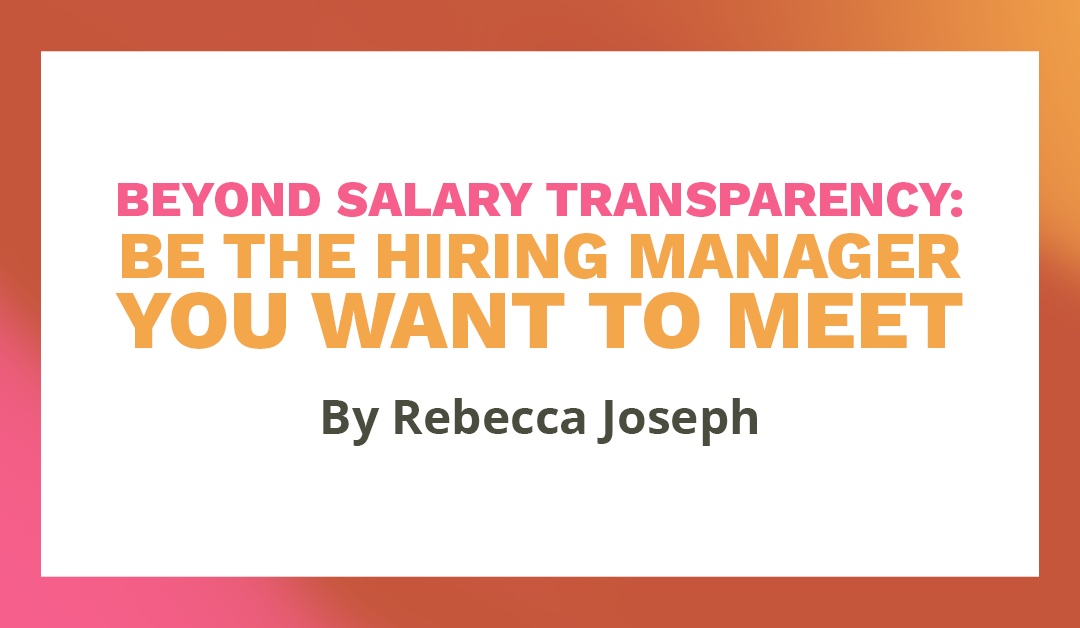By Rebecca Joseph, consultant and coach
In my experience, few of us are trained, mentored, or coached in how to effectively use the power we hold as hiring managers to force fundamental change in how our organizations actually show up.
I dread job searches. I look forward to them about as much as buying pants online or trying to find the person at a corporate bank who can override the system software to correct an ownership error in an old organizational account. I know that I’m not alone about this.
Not long ago, I asked the development director at a fast-growing nonprofit known for its leadership on racial justice and LGBTQ+ issues how the search was going for their new associate director position. They had a lot to say. None of it was good. The “perfect candidate” accepted a verbal offer, then wanted to renegotiate upon receiving the letter of hire.
The candidate told them she was having second thoughts about taking a job that required a cross-country relocation and, after looking at salaries for comparable positions, felt the offer was too low.
A week later, the development director I talked to was still furious about this, attributing the unanticipated turn of events to an unacceptable lack of professionalism. (Personally, I wondered whether the candidate’s second thoughts might also be related to her interview with the executive director being rescheduled four times.)
If only this was an isolated incident at one organization. It’s not. I know about this next situation because it happened to me.
An international nonprofit looking to hire a development manager for its senior leadership team used its fundraising consultants, a WOC-led firm, to screen candidates. Flexing his over-developed power muscles, the first interview question, asked by the CEO (a white, cisgender man), was, “What would your supervisor say are your strengths and weaknesses?”
That position is still vacant, also.
In the spirit of giving credit where it’s due, both organizations had the right language in their job announcements and included hiring salaries. How could things go so wrong from there?
With all the openings in nonprofits right now and the huge number of people changing jobs, you’d think that there would be some success stories to serve as counterpoint to ones I just shared (and many more that are far worse). I recently asked an online community of development professionals with over 10,000 members about recent hiring experiences that went well. Guess how many people responded?
Exactly two. (A white woman in consulting directed me to her instructional e-book on HR practices. A white man currently working in a nonprofit offered to share his horror stories. He is writing a book, too.)
I have never been an HR professional and have no plans to write a book on hiring. Still, since I’m a few decades into my career, I’ve been through a lot of hiring processes as a candidate, hiring manager, and now as a consultant and coach to nonprofits and people seeking career advancement or in transition.
Why are bad hiring experiences pervasive?
Imagine what can happen if we approach the work of hiring as holistic and transformative rather than transactional.
In my experience, few of us are trained, mentored, or coached in how to effectively use the power we hold as hiring managers to force fundamental change in how our organizations actually show up. As a result, we often reproduce the very same practices that ultimately reinforce white supremacy and other oppressive structures.
We must recognize that harm begins long before a newly hired person works their first day.
I know of a regional office of a large human rights organization where the entire staff assembled to give feedback to a senior human resources director visiting from the national headquarters on a West Coast listening tour. One after the next, associates and assistants shared their stories of struggling to live on the salaries from their full-time jobs. They asked how the organization determines annual pay levels.
Without missing a beat, the HR director responded with, “Based on the replacement cost for the position in that market.”
When we pass off responsibility for using the power that we have to advance justice within our organizations to coworkers or consultants whose primary job responsibilities require them to prioritize the market value of roles, manage compliance, and protect the employer from liability, we cannot expect different results. Yet, nonprofits often delegate the task of hiring to entities with just those kinds of approaches (whatever it’s called — Human Resources, Talent, People and Culture).
Imagine what can happen if we approach the work of hiring as holistic and transformative rather than transactional.
Sounds great, you say, but you don’t have the time/money/support for this? You just need someone to do the work, you say? Last week, you say?
I hear you.
It’s time for a framing intervention when our thinking heads this way. Applying Teng and Nuñez’s distinction between ‘valuators’ — people who make “objective,” “neutral” judgments about the amount, number, or value of something usually determined by a third (typically white) party — and ‘e-valuators’ is helpful here.
Transformational, justice-advancing hiring leaders are e-valuators who:
See value in people, relationships, and actions of the interplay between what’s visible and what’s hidden or obscured.
They recognize their own biases, manage them, and hold themselves accountable to the biases throughout the hiring process.
Use knowledge and thought, emotions and feelings, and intuitive, spiritual knowing to discern value.
They identify the norms and standards of their organization’s hiring practices, including the unwritten ones, that are most likely to elicit feelings of anger, fear, shame, and despair. If they can’t eliminate them, they look for ways to reduce harm and use them.
Weave the connections and relationships for leverage, influence, and power in service of more justice.
They recognize that they’re getting paid to spend their time doing this. They’ll have a job and the benefits of a new hire when it’s over. Knowing that most of the people they’ll encounter in this undertaking don’t and won’t, they take care in their choice of words and actions.
They ask job candidates if they would like referrals to other organizations seeking new staff. When they say yes, they follow up by connecting candidates to nonprofits that are hiring.
And imagine what we will change when we all recognize that participating in our organization’s hiring process is work and we insist on compensating candidates fairly for the time they spend preparing for and taking part in interviews, assessments, and assignments. Imagine if we reimburse them for travel and other related expenses, too.
If you’re still in the “I don’t have the time/money/support for this” thought loop, try starting with one small thing like having a follow-up conversation with everyone you’ve interviewed.
Use what you learn to grow your power to be the hiring manager you want to meet. And, please, share your great story so that we can all learn with you.

Rebecca Joseph, Ph.D.
Rebecca Joseph, Ph.D. (she/her) is a San Francisco Bay Area-based consultant, coach, and mentor to rising and established leaders of small and mid-size justice-driven organizations. She has held positions in the nonprofit, philanthropic, and public sectors, as well as in higher education. Currently, she serves as Treasurer of Development Executives Roundtable (DER), on Jewish Studio Project’s board, and is an Allies in Action Amplifier. Contact her at rebeccajoseph18@gmail.com. All tips Rebecca receives through her Venmo (@Rebecca-Joseph-18) will be paid forward to Delgracia Corp. She also encourages direct donations made to them.
Discover more from CCF
Subscribe to get the latest posts sent to your email.


Thank you for putting into words what many – on the hiring and interviewing end of things – are feeling right now.
I’m a senior/executive level development professional who has been asked to put in about twenty hours of work for an interview process, which cuts into the hours I freelance, therefore is losing me money earned (I’m also a full-time mother of a small child). Is it possible to even request compensation for this prep work that is essentially offering this organization a framework of a fundraising strategy that most of my clients pay for?